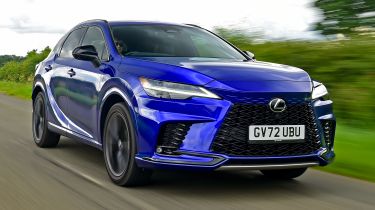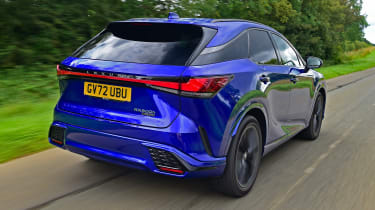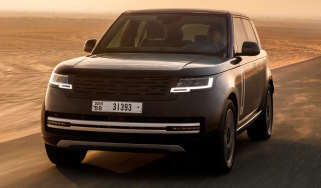Lexus RX review
The new Lexus RX is more efficient than ever, with much improved technology on board, but it comes up short in terms of practicality

The latest Lexus RX is another big leap forward for the Japanese carmaker. The wealth of technology on board is thoroughly impressive, the build quality is phenomenal and there’s finally a plug-in hybrid version.
In fact, the mid-range plug-in RX 450h+ is our pick of the range, thanks to its superior fuel economy and refinement over the less expensive but still easy-going RX 350h ‘self-charging’ hybrid. The range-topping 500h is an appealing offering as it uses a ‘performance hybrid’ system but while it’s the best RX to drive, it’s not exactly a sporty SUV. Plug-in hybrid versions of the RX’s key rivals can go further on battery power alone and are even more efficient, so there’s still room for improvement.
Sadly there’s no sign of a seven-seat RX L either, and for such a large SUV boot space is average, rather than generous. But the RX continues to prioritise comfort over driving dynamics, so if you're looking for a large, refined, easy-going SUV – and you can stomach the styling – Lexus’s flagship SUV is better than ever.
About the Lexus RX
The original Lexus RX launched back in 1998 at the dawn of the luxury SUV boom. With its foot in the segment nice and early, Lexus enjoyed great success with the combination of comfort, impeccable build quality and peerless reliability the RX offered.
More reviews
Car group tests
In-depth reviews
Road tests
- New Lexus RX 500h 2023 review
- New Lexus RX 450h+ 2023 review
- New Lexus RX 350h 2022 review
- New Lexus RX 450h F Sport 2019 review
Used car tests
Those traits have been at the forefront of every RX since but the most important model was arguably the second-generation of the mid-2000s – touted as the first luxury hybrid vehicle in RX 400h form.
The latest, fifth-generation Lexus RX is also available exclusively with hybrid power in the UK, offered with a choice of ‘self-charging’ hybrid or plug-in hybrid (PHEV) powertrains.
However, you’ll find hybrid technology in the lion share of the RX’s closest rivals in the large luxury SUV segment, including the BMW X5, Mercedes GLE, Volvo XC90, Range Rover Sport and Porsche Cayenne. All five are available in plug-in hybrid form, but those looking to seriously reduce their running costs may also find some fully electric SUVs like the BMW iX, Audi Q8 e-tron and Tesla Model X very attractive.
Unlike the previous-generation RX, this new version is only available with five seats, with no signs yet that the seven-seat RX L will return to Lexus’s line-up.
The ‘self-charging’ hybrids are the RX 350h, which produces 247bhp from a 2.5-litre four-cylinder petrol and two electric motors, while the RX 500h “performance hybrid” pumps out 366bhp from its pair of e-motors and a turbocharged 2.4-litre petrol engine – the first time Lexus has mated turbocharging with hybrid power.
In the middle of the pack sits the RX 450h+, which Lexus expects to account for more than half of RX sales. The first-ever RX PHEV uses a 2.5-litre four-cylinder petrol engine and two electric motors again, this time supplied by a much larger 18.1kWh battery. The benefits are an electric driving range of around 40 miles, greatly reduced CO2 emissions and official fuel economy of 256.7mpg – compared with around 40mpg for either of the ‘self-charging’ hybrid models.
Both the RX 350h and 450h+ are available in Premium, Premium Plus and Takumi specifications, while the RX 500h is offered exclusively in F Sport trim – although every version is impressively equipped. Standard kit includes a 14-inch central touchscreen with Android Auto and wireless Apple CarPlay smartphone connectivity, a wireless smartphone charging pad, heated front seats, electrically adjustable front seats, three-zone climate control and a suite of safety aides as part of the ‘Lexus Safety System +3’.
For an alternative review of the Lexus RX, visit our sister site carbuyer.co.uk...










